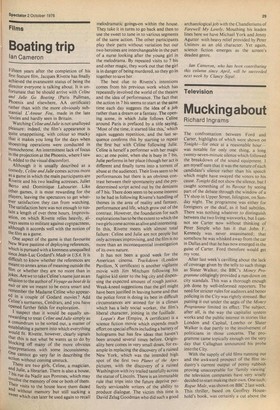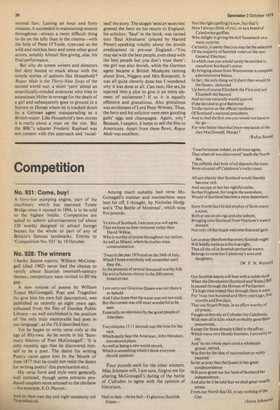Television
Mucking about
Richard Ingrams
The confrontation between Ford and Carter, highlights of which were shown on Tonight—for once at a reasonable hour--was notable for only one thing, a long twenty-seven-minute silence which followed the breakdown of the sound equipment. I am myself sure that it was the nature of each candidate's silence rather than his speech which might have swayed the voters to his cause. Tonight did not show the silence, but I caught something of its flavour by seeing part of the debate through the window of a TV shop in Upper Street, Islington, on Sunday night. The programme was either for foreigners or the deaf, as it had subtitles. There was nothing whatever to distinguish between the two living waxworks, but I cannot see Carter now without thinking of Peter Simple who has it that John F. Kennedy was never assassinated; that somehow he was whisked away from the car in Dallas and that he has now emerged in the guise of Carter. Ford therefore would get my vote.
After last week's cavilling about the lack of coverage given by the telly to such things as Slater Walker, the BBC's Money Programme obligingly provided a run-down on city scandals. This was a thorough enough job done by well-informed reporters. The need for stricter rules for auditors and better policing in the City was rightly stressed. But putting it out under the aegis of the Money Programme limited its effect. The subject, after all, is the way the capitalist system works and the public interest in stories like London and Capital, Lonrho or Slater Walker is due partly to the involvement of politicians in those concerns. The programme came topically enough on the very day that Callaghan announced his probe into the City.
With the supply of old films running out and the awkward prospect of the film industry's current output of porny rubbish proving unacceptable for 'family viewing' the television companies have very wisely decided to start making their own. One such, Rogue Male, was shown on BBC 2 last week. This thriller, based on Geoffrey Household's book, was certainly a cut above the normal fare. Lasting an hour and forty minutes, it succeeded in maintaining tension throughout—always a more difficult thing to do on the telly than in the cinema—with the help of Peter O'Toole, type-cast as the wild and reckless hero and some other good actors, notably Alistair Sim giving, alas, his final performance.
But why do screen writers and directors feel duty bound to muck about with the simple stories of authors like Household? Rogue Male is the Thirty-Nine Steps of the second world war, a short 'yarn' about an anarchically-minded aristocrat who tries to assassinate Hitler in revenge for the death of a girl and subsequently goes to ground in a burrow in Dorset where he is tracked down by a German agent masquerading as a British major. Like Household's best stories it is really about a man on the run. But the BBC's adapter Frederic Raphael was not content with this approach and 'racial ised' the story. The slogan 'MOSLEY MARCHES' greeted the hero on his return to England; his solicitor, 'Saul' in the book, was turned into 'Saul Abrahams' (played by Harold Pinter) speaking volubly about the Jewish predicament in pre-war England 'You may eat with the best people, even sleep with the best people but you don't trust them': the girl was also Jewish, while the German agent became a British Mosleyite ranting about Jews, Niggers and Mrs Roosevelt. It was all quite cleverly done but I wondered why it was done at all. Can race, like sex,be injected into a plot to give it an extra element of excitement ? If so it is equally offensive and gratuitious. Also gratuitous was an element of Lord Peter Wimsey. Thus, the hero and his solicitor were seen guzzling gulls' eggs and champagne. Again, why ? Because, I suspect, it helps to sell the film to Americans. Apart from these flaws, Rogue Male was excellent.
Not the right spelling 1 know, but that's
Howl always think of you ; or as a breed of
Caledonian gadflies Who delight in giving the dull Sassenach ox a nasty surprise.
Certainly, it seems that you may be the selection Of the majority of Scottish voters at the next General Election ; !n which case you would surely be entitled to transform Scotland's status By bringing about from Westminster a complete administrative hiatus.
In fact, the only thing we'd share then would be the Queen, reckoned Up here of course Elizabeth the First and not Elizabeth the Second.
And no one naturally would quarrel If she decided to give Balmoral To the nation as the official residence Of Scotland's national presidents.
And to find the first one you would not have to
far go—
For who better than that braw wee lassie of the clan MacDonald, Margo?
(Rufus Stone)



































 Previous page
Previous page